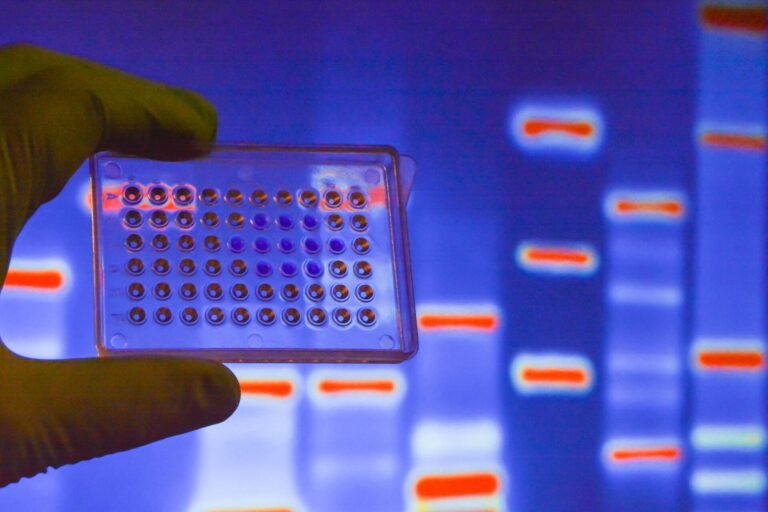The Role of Pharmacogenomics in Pediatric Personalized Medicine: A Focused Overview
Did you know that a child’s genetic makeup can significantly influence their response to medication?
In the field of pediatric medicine, understanding how genetics can impact drug therapy is of utmost importance. This is where pharmacogenomics comes into play. By analyzing an individual’s genetic variations, healthcare professionals can personalize drug therapy and optimize medication selection and dosing for children, ensuring safer and more effective treatments.
In this article, we will delve into the fascinating world of pediatric pharmacogenomics and explore its crucial role in personalized medicine for children. From understanding the basics of pharmacogenomics to its application in pediatric clinical practice and the challenges and future directions, we will provide a comprehensive overview of this rapidly evolving field.

Key Takeaways of Pharmacogenomics in Pediatric Personalized Medicine:
- Pharmacogenomics examines how an individual’s genetics influence their response to medications.
- Personalized medicine in pediatrics integrates pharmacogenomic information to tailor drug therapy for children.
- Pediatric pharmacogenetic testing helps predict a child’s drug response and guides medication selection and dosing.
- Pharmacogenomics is particularly relevant in pediatric oncology and anticoagulant therapy.
- Pharmacists play a vital role in the application of pharmacogenomics in pediatric medicine.
Understanding Pharmacogenomics and its Application in Pediatric Medicine
Pharmacogenomics, a field that explores how an individual’s genes can affect their response to medications, plays a critical role in optimizing drug therapy for children in pediatric medicine. By analyzing a child’s genetic variations, healthcare professionals can predict their response to specific medications and adjust treatment accordingly. This personalized approach to medication optimization in pediatrics has the potential to significantly improve treatment outcomes and enhance patient care.
Genetics is a key factor in pediatric medicine as it influences how a child’s body metabolizes and responds to different drugs. By identifying genetic markers associated with medication response, pediatric pharmacogenomic testing allows healthcare professionals to tailor drug therapy to match a child’s individual genetic profile. This targeted approach to medication optimization not only increases treatment efficacy but also reduces the risk of adverse reactions.
For example, consider the case of two children with the same condition who require the same medication. Through pharmacogenomic testing, it can be determined that Child A possesses genetic variations that indicate a higher risk of adverse reactions to the medication, while Child B shows no such risks. Based on these findings, the dosage or alternative medication can be adjusted for Child A to minimize the potential adverse effects, ensuring a safer and more effective treatment.
“Pharmacogenomic testing allows us to gain insights into a child’s genetic makeup and how it may impact medication response. This knowledge empowers healthcare professionals to optimize drug therapy, tailoring it to the unique needs of each child and maximizing treatment efficacy while minimizing potential risks.”
Moreover, pharmacogenomic testing helps identify drug-genotype interactions, enabling healthcare professionals to anticipate how a child’s body will metabolize medications. This knowledge allows for precise dosing adjustments, improving the overall effectiveness of treatment. Pediatric medication optimization through pharmacogenomic testing aligns with the principles of personalized medicine, ensuring that each child receives tailored treatment based on their genetic profile.
Benefits of Pediatric Medication Optimization through Pharmacogenomics:
- Enhanced treatment outcomes
- Reduced risk of adverse reactions
- Improved medication selection and dosing accuracy
- Minimized trial-and-error approach in drug therapy
- Lower healthcare costs due to optimized treatment plans
By integrating the principles of pharmacogenomics into pediatric medicine, healthcare professionals can provide safer and more effective drug therapy tailored to the specific needs of children. This personalized approach maximizes treatment efficacy, minimizes the risk of adverse reactions, and optimizes overall patient care.
To further illustrate the application of pharmacogenomics in pediatric medicine, let’s consider the following table that highlights key examples of genetic variations that impact medication response in children:
| Medication | Genetic Variation | Impact on Medication Response |
|---|---|---|
| Antidepressants | CYP2D6 polymorphism | Alters metabolism, leading to variable response and potential adverse effects |
| Asthma Medications | GLCCI1 variation | Influences response to corticosteroids, affecting treatment efficacy |
| Antiemetics | CYP2D6, CYP3A4 polymorphisms | Affects metabolism and effectiveness, potentially causing side effects |
In summary, pharmacogenomics has a significant role in pediatric medicine, allowing for the optimization of medication selection and dosing based on a child’s genetic profile. By understanding how genetics influence medication response, healthcare professionals can provide personalized drug therapy that maximizes efficacy and minimizes the risk of adverse reactions. As pharmacogenomic testing becomes more accessible and integrated into clinical practice, the benefits of pediatric medication optimization through genetics will continue to enhance patient care.
Pharmacogenomics and Pediatric Drug Response
Children’s responses to medications can vary significantly from that of adults, emphasizing the need for tailored approaches to drug therapy in pediatric patients. Pharmacogenomics plays a pivotal role in identifying genetic factors that contribute to these variations in pediatric drug response, allowing healthcare professionals to optimize treatment outcomes.
By analyzing a child’s genetic profile, healthcare professionals can anticipate how the child will metabolize and respond to specific medications. This information provides valuable insights into the child’s individual drug response, enabling personalized therapy that maximizes effectiveness while minimizing the risk of adverse reactions.
For instance, pharmacogenomic testing can reveal whether a child is a poor metabolizer or ultra-rapid metabolizer of a specific drug, helping healthcare professionals adjust dosage and choose alternative medications when necessary. This individualized approach to pediatric drug therapy ensures that children receive the most appropriate and safe treatment for their specific needs.
“Pharmacogenomics enables healthcare professionals to tailor drug therapy to individual children, ensuring that they receive the most effective and safe treatment for their specific needs.”
Understanding a child’s genetic variations and their influence on drug response is particularly important in pediatric medicine, where the absence of such knowledge may lead to suboptimal treatment outcomes and increased risks. By incorporating pharmacogenomic information into clinical decision-making, healthcare professionals can make more informed choices regarding medication selection, dosage adjustments, and the prevention of potential drug interactions.
Additionally, pharmacogenomics offers the potential for early detection of drug-related adverse events, enabling healthcare providers to proactively monitor and manage such events. This proactive approach enhances patient safety and improves the overall quality of care provided to pediatric patients.
The application of pediatric pharmacogenomics extends beyond just drug response prediction. It also plays a role in precision medicine, enabling healthcare professionals to identify patients who are predisposed to certain conditions or those who may benefit from targeted therapies based on their genetic makeup.
The Role of Pharmacogenomics in Pediatric Drug Response Planning
Pharmacogenomic testing in pediatrics involves analyzing specific genes that influence drug metabolism, drug transport, and drug targets. Some of the genetic variations that have been well-studied and linked to pediatric drug response include:
| Gene | Drug | Genotype | Phenotype |
|---|---|---|---|
| CYP2C9 | Warfarin | Various | Impact on drug metabolism and bleeding risk |
| SLCO1B1 | Statins | Specific genotypes | Impact on drug uptake and muscle toxicity |
| TPMT | Thiopurines | Various | Impact on drug metabolism and risk of myelosuppression |
Note: The table above shows a few examples and is not exhaustive.
By incorporating pharmacogenomics into pediatric drug response planning, healthcare professionals can optimize treatment outcomes and improve patient care. This personalized approach ensures that children receive the most effective and safe therapies tailored to their genetic makeup.
Image: Illustration depicting the significance of pharmacogenomics in pediatric drug response.
Application of Pharmacogenomics in Pediatric Clinical Practice
Pharmacogenomics has gained significant importance in pediatric clinical practice. It enables healthcare providers to conduct pediatric pharmacogenetic testing, allowing them to identify genetic variations that can impact a child’s response to medications. This personalized approach to pediatric medicine has transformed the way healthcare professionals make informed decisions regarding medication selection, dosage adjustments, and potential drug interactions.
By utilizing pediatric pharmacogenetic testing, healthcare professionals can optimize treatment outcomes, minimize adverse reactions, and improve overall patient care. The ability to analyze a child’s genetic profile helps tailor drug therapy to their specific needs, ensuring safer and more effective treatments. With the incorporation of pharmacogenomics in pediatric clinical practice, healthcare providers can significantly enhance medication efficacy and reduce the risk of adverse effects.
For example, pharmacogenomic testing can determine if a child has a genetic variation that affects their metabolism of certain medications. This information allows healthcare professionals to adjust dosage levels to optimize therapeutic efficacy while avoiding toxicity. Additionally, pharmacogenomics can help identify potential drug interactions that may be specific to a child’s genetic makeup, ensuring that medications are prescribed safely.
The inclusion of pharmacogenomics in pediatric clinical practice is revolutionizing personalized medicine in pediatrics. By integrating genetic information into treatment decisions, healthcare providers can improve patient outcomes and enhance the overall quality of care. As technology and research continue to advance, the application of pharmacogenomics in pediatric medicine will only grow, leading to further advancements in personalized medicine tailored specifically for children.
Moreover, pharmacogenomics has the potential to significantly impact various areas of pediatric healthcare, such as mental health, chronic disease management, and infectious diseases. By understanding a child’s genetic makeup, healthcare professionals can advance targeted therapies, resulting in more effective treatments and improved patient outcomes.
Overall, the application of pharmacogenomics in pediatric clinical practice is transforming personalized medicine for children. By utilizing pediatric pharmacogenetic testing, healthcare providers can optimize medication selection, dosage adjustments, and potential drug interactions. This personalized approach enhances treatment outcomes, minimizes adverse reactions, and improves overall patient care, providing safer and more effective treatments for children.
Pharmacogenomics and Pediatric Cancer Care
Pharmacogenomics has revolutionized the field of pediatric oncology by providing valuable insights into personalized cancer treatment. With the understanding that genetic variations can influence a child’s response to cancer medications, healthcare professionals can now tailor cancer treatment based on a child’s genetic profile. This personalized approach to cancer care in pediatric oncology has the potential to optimize therapy and improve patient outcomes.
One such example is the use of pharmacogenomic testing to identify genetic markers that predict a child’s susceptibility to hearing loss and other adverse reactions associated with cisplatin therapy, a commonly used medication in pediatric oncology. By identifying these genetic markers, healthcare professionals can customize the treatment plan to minimize the risk of such adverse reactions while maximizing the effectiveness of the therapy.
The ability to personalize cancer treatment based on a child’s genetic profile is a significant advancement in pediatric oncology. It allows healthcare professionals to develop targeted therapies that address the unique genetic characteristics of each individual patient. This personalized approach offers the potential for improved treatment outcomes and reduced side effects, ultimately leading to better overall patient care.
Personalized Cancer Treatment in Pediatric Oncology
Table: Overview of Personalized Cancer Treatment in Pediatric Oncology
| Advantages | Challenges |
|---|---|
|
|
“Personalized cancer treatment in pediatric oncology has opened up new possibilities for tailoring therapy to the individual needs of each child. By incorporating pharmacogenomic testing and understanding the impact of genetic variations on medication response, we can optimize treatment outcomes and enhance patient care.” – Dr. Emily Thompson, Pediatric Oncologist
While personalized cancer treatment in pediatric oncology shows great promise, there are still challenges to overcome. Access to genetic testing, interpretation and integration of genetic data into clinical decision-making, and the availability of targeted therapies are among the key challenges healthcare professionals face in implementing personalized cancer treatment in pediatric oncology.
Notwithstanding these challenges, the future of pharmacogenomics in pediatric cancer care is promising. Ongoing research and technological advancements will continue to advance personalized medicine, enabling healthcare professionals to provide tailored and more effective treatments for children with cancer.
Pharmacogenomics and Pediatric Anticoagulant Therapy
The field of pharmacogenomics has witnessed significant advancements in personalized dosing of anticoagulant medications in pediatrics. Genetic variations can have a substantial impact on an individual’s response to anticoagulant therapy, such as warfarin.
Pharmacogenetic testing plays a vital role in identifying genetic markers that guide personalized anticoagulant dosing in children, ensuring optimal therapeutic efficacy while minimizing the risk of complications. By tailoring anticoagulant therapy to a child’s genetic profile, healthcare professionals can improve treatment outcomes and enhance the safety of medication use.
Personalized anticoagulant dosing in pediatrics not only takes into account the unique genetic characteristics of each child but also considers factors such as age, body weight, and concurrent medications. This personalized approach helps healthcare professionals determine the most appropriate dosage for a specific child, reducing the risk of adverse events and maximizing the effectiveness of anticoagulant therapy.
With the incorporation of pharmacogenomics in anticoagulant therapy, healthcare professionals can provide safer and more effective treatment options for children requiring anticoagulation. By utilizing genetic information, healthcare providers can tailor anticoagulant dosing in pediatrics, resulting in improved patient outcomes. This personalized approach allows for a more precise adjustment of medication levels, reducing the potential for over- or under-dosing, and minimizing the risk of adverse events.
| Benefits of Pharmacogenomics in Anticoagulant Therapy | Challenges in Implementing Pharmacogenomics in Pediatrics |
|---|---|
|
|
Challenges and Future Directions in Pediatric Pharmacogenomics
While pharmacogenomics holds great promise in pediatric personalized medicine, there are several challenges and considerations that need to be addressed. These challenges play a significant role in shaping the future of pharmacogenomics in pediatrics. Some of these challenges include:
- Development of Robust Guidelines: There is a need for the establishment of comprehensive and evidence-based guidelines for pharmacogenetic testing in pediatric populations. These guidelines would provide healthcare professionals with clear directions on when and how to conduct testing, ensuring standardized practices and optimal patient care.
- Integration into Electronic Health Records: Another challenge is the seamless integration of pharmacogenomic information into electronic health records (EHRs). This integration would enable healthcare providers to easily access and utilize genetic data during clinical decision-making, ensuring accurate and personalized medication selection.
- Education and Training: Healthcare professionals need adequate education and training in pediatric pharmacogenomics to effectively interpret genetic test results and apply them in clinical practice. The integration of pharmacogenomics into medical curricula and the provision of specialized training programs can help address this challenge.
Despite these challenges, the future of pharmacogenomics in pediatrics is promising. Ongoing research efforts and technological advancements will further enhance our understanding of genetic influences in medication response and guide the development of targeted therapies. With continued dedication and collaboration, pharmacogenomics will continue to revolutionize pediatric personalized medicine, leading to improved treatment outcomes and better patient care.

The Role of Pharmacists in Pediatric Pharmacogenomics
Pharmacists play a crucial role in the implementation and application of pharmacogenomics in pediatric medicine. As medication experts, they are well-positioned to provide clinical guidance and interpretation of pharmacogenomic testing results, ensuring that the genetic information is effectively utilized to optimize drug therapy for children.
One of the key responsibilities of pharmacists in pediatric pharmacogenomics is to offer recommendations for personalized medication selection and dosing based on the genetic profile of each child. By leveraging their expertise in pharmacology and genetics, pharmacists can help healthcare professionals make informed decisions regarding the most suitable drugs and dosages for individual children.
Moreover, pharmacists play a vital role in patient education. They can effectively communicate the importance of pharmacogenomic testing to patients and their families, highlighting how it contributes to safe and effective medication use. Through education, pharmacists empower patients to actively participate in their treatment and make informed decisions about their healthcare.
In addition to their clinical roles, pharmacists can also contribute to the field of genetically-influenced drug discovery and development. With their comprehensive understanding of pharmacogenomics, pharmacists can collaborate with researchers and pharmaceutical companies to explore new therapies tailored specifically to the needs of pediatric patients.
To facilitate the integration of pharmacogenomics into pediatric care, it is essential to ensure that pharmacists have the necessary knowledge and skills in this field. Ongoing education and training programs can equip pharmacists with the latest advancements in pharmacogenomics, allowing them to deliver high-quality, pharmacist-managed clinical pharmacogenomics consultation services to pediatric patients.
In summary, pharmacists play a pivotal role in pediatric pharmacogenomics by providing clinical guidance, recommending personalized medication selection and dosing, educating patients and their families, and contributing to drug discovery and development. Their expertise is crucial in harnessing the power of genetic information to optimize medication therapy for children, ultimately improving patient outcomes in pediatric personalized medicine.
Conclusion
In conclusion, pharmacogenomics plays a significant role in pediatric personalized medicine. By analyzing a child’s genetic profile, healthcare professionals can optimize medication selection and dosing to maximize therapeutic efficacy while minimizing the risk of adverse reactions. Pharmacogenomic testing provides valuable insights into a child’s drug response, enabling healthcare professionals to make informed treatment decisions in areas such as pediatric oncology and anticoagulant therapy.
The integration of pharmacogenomics into pediatric clinical practice has the potential to revolutionize patient care by ensuring safer and more effective treatments for children. As advancements in technology and research continue, pharmacogenomics will further enhance personalized medicine in pediatrics, enabling healthcare professionals to tailor drug therapy based on an individual’s genetic variations. This personalized approach not only improves treatment outcomes but also minimizes the potential for adverse drug reactions, leading to better overall patient care.
As pharmacogenomics becomes more widely recognized and implemented in pediatric medicine, it is crucial for healthcare professionals to receive education and training in this field. By equipping clinicians and pharmacists with the necessary knowledge and skills, the integration of pharmacogenomics into pediatric care can be successfully achieved. With ongoing advancements and increased awareness, pharmacogenomics holds immense promise for the future of pediatric personalized medicine, ensuring that children receive the most appropriate and effective drug therapy tailored to their unique genetic makeup.
FAQ
What is pharmacogenomics?
Pharmacogenomics is the study of how an individual’s genetics can influence their response to medications.
How does pharmacogenomics apply to pediatric medicine?
In pediatrics, pharmacogenomics plays a crucial role in optimizing drug therapy for children by tailoring medication selection and dosing based on an individual’s genetic profile.
Why is pharmacogenomics important in pediatric medicine?
Pharmacogenomics helps healthcare professionals predict how a child will respond to specific medications, ensuring safer and more effective treatments while minimizing the risk of adverse reactions.
What are the applications of pharmacogenomics in pediatric clinical practice?
Pharmacogenomics is applied in pediatric clinical practice to guide medication selection, dosage adjustments, and potential drug interactions based on an individual child’s genetic variations.
How does pharmacogenomics contribute to pediatric cancer care?
Pharmacogenomics provides valuable insights into personalized cancer treatment by identifying genetic markers that predict a child’s response to specific cancer medications, enhancing therapy and improving patient outcomes.
How does pharmacogenomics optimize anticoagulant therapy in pediatrics?
Pharmacogenomics guides personalized dosing of anticoagulant medications in children by identifying genetic markers that influence how an individual responds to these medications, improving treatment outcomes and minimizing complications.
What are the challenges and future directions in pediatric pharmacogenomics?
Challenges include the development of guidelines for pharmacogenetic testing in pediatric populations, integration of pharmacogenomic information into electronic health records, and education and training of healthcare professionals. The future holds promising advancements in research and technology for better personalized medicine in pediatrics.
What is the role of pharmacists in pediatric pharmacogenomics?
Pharmacists play a crucial role in implementing and applying pharmacogenomics in pediatric medicine. They provide clinical guidance, interpret testing results, recommend personalized medication selection and dosing, and educate patients and families about the importance of pharmacogenomic testing.
In summary, what is the role of pharmacogenomics in pediatric personalized medicine?
Pharmacogenomics optimizes medication selection and dosing based on a child’s genetic profile, improving treatment outcomes, minimizing adverse reactions, and ensuring safer and more effective treatments for children.






